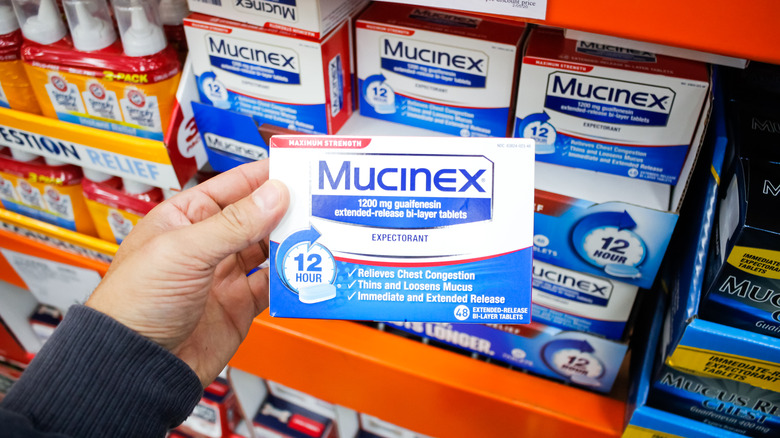What Taking Mucinex Does To Your Body
We get it — dealing with a cough and congestion is no fun, especially when it drags out for more than a day or two. While some mucus in the airways is a normal and healthy part of your body's immune system's defense, excessive mucus that just sits in place can lead to bacterial growth, which can increase the risk of infection (via Verywell Health). When you just want some relief — and fast — it's tempting to reach for a bottle of Mucinex. But there are some things you should know before doing so.
Mucinex is the brand name for the drug guaifenesin. Guaifenesin is classified as an expectorant, which means that it is used to both increase the volume of mucus secretions as well as thin them out, making them easier to cough up and clear out of the airways (via Drugs.com). According to Science Direct, it is also a known muscle relaxant and is commonly used by veterinarians for that purpose on animals during surgery.
Mucinex may or may not help you feel better
The problem is that there's not much evidence to suggest that Mucinex actually carries through on its promises. Multiple studies have found that the drug is not particularly effective at thinning mucus or at reducing a cough. In a 2014 study of nearly 300 adults and adolescents sick with a cold or cough, Mucinex was found to provide no more relief than a placebo (via Respiratory Care). Leader of the study Dr. Bruce Rubin, chair of the Department of Pediatrics at the Virginia Commonwealth University Medical Center, concluded that "It doesn't really help clear out mucus" (via CBS News). He adds, though, that this doesn't mean it won't have any positive effect at all. Though it may not offer much when it comes to mucus buildup, Mucinex may offer relief for other symptoms.
Whether you reach for Mucinex during your next cold, or try something else, be careful to follow the package directions with regards to dosage and timing to reduce the risk of side effects.


